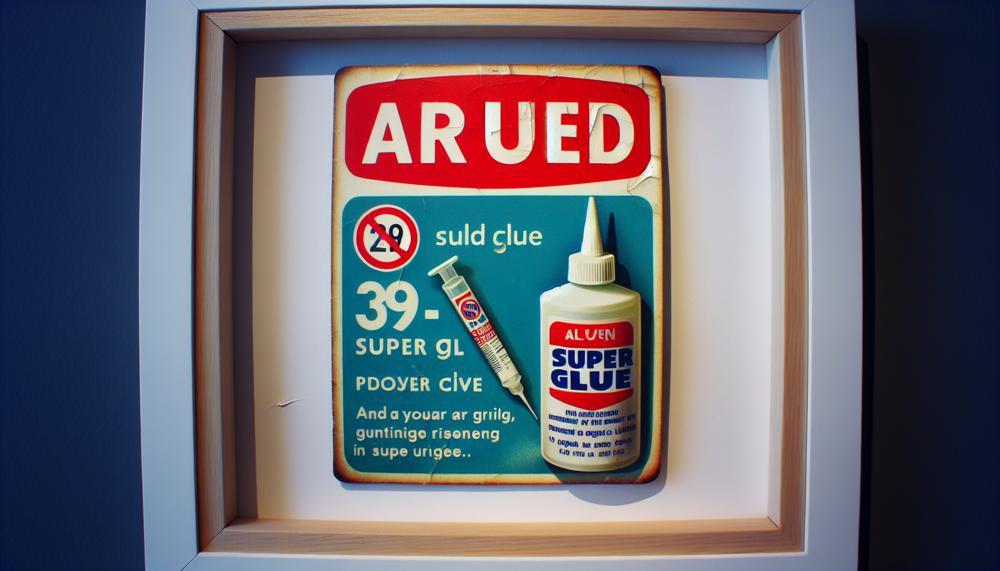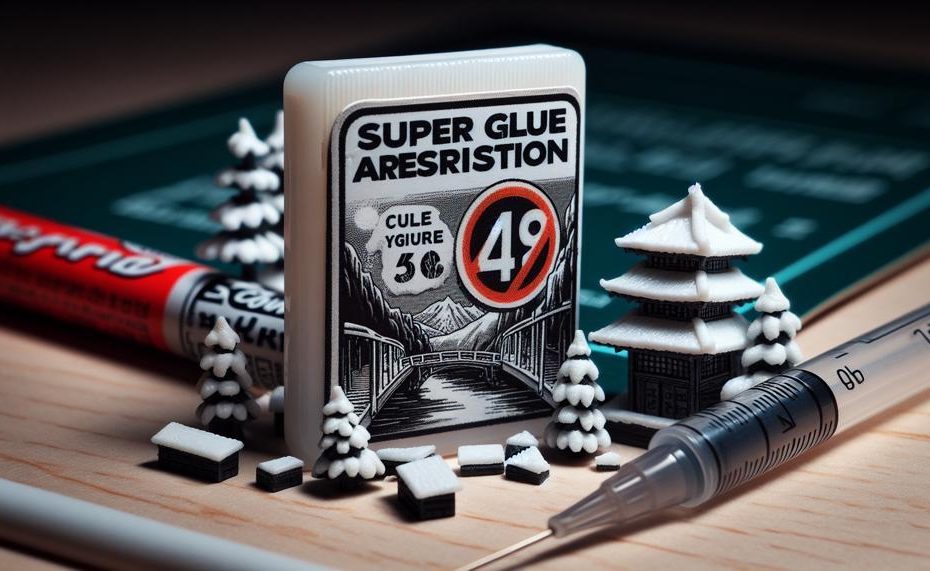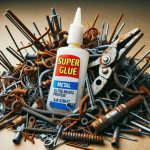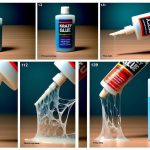Picture this: you’re in a bind and need to fix something quickly, so you reach for a tube of super glue.
But as you read the label, you realize that it’s age-restricted. Sound familiar? This common household adhesive has been off-limits for minors for years, leaving many wondering why.
In this blog post, we’ll uncover the reasons behind the age restriction on super glue and shed light on this often overlooked topic. Here are some key points to keep in mind:
- Super glue is a powerful adhesive that can bond skin and other materials together in mere seconds.
- The main ingredient in super glue, cyanoacrylate, can cause serious burns and irritation if mishandled.
- Children are naturally curious and have a higher risk of accidentally ingesting or misusing super glue.
- The age restriction on super glue varies by country but is typically set at 18 years old.
- Some experts argue that the age restriction should be lowered to 14 or even 12 years old, while others believe it should remain at 18.
Now that we have your attention, let’s delve deeper into the reasoning behind this seemingly strict rule.
Table of Contents
- 1 What Is Super Glue?
- 2 Why Super Glue Is Age Restricted?
- 3 Potential Hazards For Children
- 4 Toxic Substances In Super Glue
- 5 Health Risks Associated With Inhaling Fumes
- 6 Laws Surrounding Age Restrictions On Super Glue
- 7 Products That Contain Cyanoacrylate Adhesives And Their Age Restrictions
- 8 Alternatives To Super Glue
- 9 How To Apply Super Glue Safely
- 10 Conclusion
What Is Super Glue?
Super glue, also known as cyanoacrylate adhesive, is a fast-acting and powerful adhesive used for quick and secure bonding of items. It is a popular household item for repairs and DIY projects. However, due to its potential hazards, super glue is classified as an age-restricted product.
Made up of two main components, cyanoacrylate and an activator, super glue creates a strong bond quickly. If not used properly, this adhesive can bond skin instantly and prove challenging to remove. Additionally, it can irritate the skin and cause respiratory problems if ingested.
To ensure the safe usage of super glue, it is crucial that only those who are mature enough to handle it have access to it. In most countries, the legal age to purchase super glue is 18 years old. This age restriction serves to protect children from harm and prioritize their well-being.
Aside from age restrictions, it is essential to carefully read the instructions when using super glue and keep it out of reach of children and pets. Misusing or using super glue illegally can result in misdemeanor charges or serious injuries.
Properly stored, super glue has an indefinite shelf life, but its effectiveness depends on the conditions of use. Exposure to moisture or extreme temperatures can weaken the bond over time. Expired super glue may not work as effectively as fresh glue and should not be used.
Why Super Glue Is Age Restricted?
Super glue, despite its convenience and strength, can also pose potential health hazards if used incorrectly.
As mentioned earlier, it can cause irritation to the skin, eyes, and respiratory system, especially in children whose bodies are still developing and may be more sensitive to these chemicals.
Ingesting large amounts of super glue can also be a choking hazard.
One of the main reasons for age restriction on super glue is its strong bonding properties. This adhesive bonds quickly and creates a permanent bond, making it difficult to remove. For children who may accidentally get it on their skin or objects they are not supposed to, this can result in injuries or property damage.
In addition to its strong bonding properties, super glue is also difficult to remove once it has bonded. This can be frustrating for children who may accidentally get it on themselves or their belongings. It may also lead to them resorting to using harsh chemicals to remove it, which can be dangerous.
Due to the potential hazards of super glue, there are strict legal regulations in place regarding its sale and use. In many countries, it is illegal to sell super glue to minors without adult supervision. This is to ensure that it is handled responsibly and safely.
The age restriction on super glue serves as a safety precaution to prevent accidents and injuries from occurring. It reminds consumers that this product should be handled with caution and kept out of reach of children.
Potential Hazards For Children
Children are particularly susceptible to the dangers of super glue due to their curious nature and limited understanding of its harmful effects. It’s essential to be aware of the potential hazards for children when dealing with super glue.
One of the most significant risks for children is accidentally ingesting super glue. Due to its small size and colorful packaging, young children may mistake it for food or a drink. If swallowed, super glue can cause irritation, burns, or blockages in the airways or digestive tract, leading to serious health consequences.
Another danger is direct contact with super glue while playing or attempting to open the container. This can result in chemical burns on the skin or eyes, causing discomfort and pain. Additionally, some children may develop an allergic reaction to the chemicals in super glue, leading to symptoms like itching, swelling, and difficulty breathing.
In rare cases, super glue ingestion or contact can cause systemic effects on the body, such as dizziness, nausea, and vomiting. To prevent these hazards, parents and caregivers must take necessary precautions when using super glue around children. This includes supervising them during use, storing it securely out of reach in a child-proof container, using it in well-ventilated areas, and wearing protective gear like gloves and eye protection.
In case of any accidents involving super glue, seek immediate medical attention to ensure proper evaluation and treatment. It’s crucial to read the label carefully and test for any allergies before using super glue.
Toxic Substances In Super Glue
The toxic substances in super glue have the potential to cause a wide range of health issues. These include skin and eye irritation, respiratory irritation, nerve damage, and even an increased risk of cancer. To protect individuals, especially children, from these potential health hazards, there are age restrictions in place for the use of super glue. This is important to keep in mind when using or handling this product.
When it comes to the toxic substances found in super glue, one must be cautious and take necessary precautions to avoid any potential health risks. These substances can cause various health issues such as skin and eye irritation, respiratory irritation, nerve damage, and even increase the risk of cancer.
Therefore, it is crucial to follow proper safety measures when handling or using super glue, especially if there are children around.
Health Risks Associated With Inhaling Fumes
Inhaling fumes from super glue can lead to respiratory issues such as irritation, asthma, bronchitis, and lung damage. These health risks are particularly concerning for children and adolescents, as their respiratory systems are still developing and they may accidentally ingest the fumes.
As a result, it’s important to limit the use of super glue in these age groups to avoid any potential health complications.
| Health Effects | Vulnerable Age Groups | Preventive Measures |
|---|---|---|
| Respiratory Irritation | Children and Adolescents | Restrict Super Glue Use |
| Severe Asthma | Children and Adolescents | Restrict Super Glue Use |
| Bronchitis | Children and Adolescents | Restrict Super Glue Use |
Laws Surrounding Age Restrictions On Super Glue
The laws surrounding age restrictions on super glue are enforced by the Consumer Product Safety Commission (CPSC) through the Federal Hazardous Substances Act (FHSA).
These regulations serve to safeguard minors from potential harm that may arise from mishandling this potent adhesive.
By preventing access to minors, the CPSC aims to mitigate risks such as skin irritation, burns, eye injuries, and accidental ingestion.
Furthermore, certain states have stricter age requirements and may mandate retailers to verify a customer’s age before selling super glue. Schools also have their own guidelines in place for the use of super glue in classrooms, prioritizing the safety of young students.
Overall, these laws and regulations seek to promote responsible usage of super glue among consumers, particularly children and adolescents whose respiratory systems are still developing.
Products That Contain Cyanoacrylate Adhesives And Their Age Restrictions

The use of cyanoacrylate adhesives can be found in a variety of products, from everyday household super glue and nail glue to medical supplies such as surgical glues and wound closure strips.
These adhesives are known for their strong bonding properties and are used in industries ranging from construction to electronics. However, due to potential safety hazards, age restrictions are implemented to protect young children who may accidentally ingest or misuse the adhesive, as well as inexperienced individuals using it for medical purposes.
In fact, these adhesives have been known to cause serious harm if not handled properly. This is why it is crucial for parents to keep these products out of reach of young children and educate them on the potential dangers.
Additionally, it is important for individuals to adhere to the age restrictions and not use these adhesives for any medical purposes without proper training.
It’s also important to note that not all cyanoacrylate adhesives are created equal. While household super glue may seem like a suitable substitute for surgical glue, they are not interchangeable. Medical-grade adhesives have stricter quality control measures and are designed specifically for use on the human body.
Alternatives To Super Glue
As previously mentioned, traditional super glue and other cyanoacrylate adhesives can be harmful to children and individuals who cannot use them due to age restrictions. However, there are various safe and effective alternatives available that offer a strong hold for different projects without the potential hazards.
One option is Tessa Bunny Organic Glue, which is made from all-natural ingredients and is non-toxic. This makes it completely safe for children to use in arts and crafts, party supplies, and even making slime.
Another alternative is the Tesa Eco Glue Stick, which is 100% organic and has a cap with deep ridges to prevent rolling. It is specifically designed with children’s needs in mind.
For lightweight craft projects, Ukkie Kids Glue is an excellent choice. It is made in Europe using high-quality ingredients and is safe for children while still providing a strong hold.
Lastly, the Onyx and Green Plant-Based Clear Glue offers an environmentally friendly option as it is made from recycled plant-based materials. Both liquid and glue stick forms are available.
By opting for these safe and effective alternatives to super glue, you can ensure the safety of your child while still being able to complete various projects. It is important to carefully read labels and choose non-toxic options when using any type of adhesive, especially when children are involved.
These alternatives not only provide a strong hold but also promote a safer and more child-friendly environment for creativity and learning.
How To Apply Super Glue Safely
Here are some tips for applying super glue safely:
Use gloves
Super glue can bond quickly to your skin, causing irritation or a mild chemical burn. Wear gloves to avoid getting glue on your skin.
Use eye protection
Avoid pointing the glue container anywhere close to your face.
Apply in a well-ventilated area
Keep away from heat, hot surfaces, sparks, open flames, and other ignition sources.
Test the fit
Before applying the adhesive, bring the two parts you want to repair together to test the fit.
Prepare the surfaces
Make sure the surfaces to be glued are clean and dry. You can slightly roughen with sandpaper if necessary.
Apply the glue
Apply a small, even amount to each surface using the applicator nozzle tip. Apply the adhesive to both surfaces. Press the surfaces together firmly and hold together with pressure for 15 seconds or until set.
Don’t use it on certain materials
Avoid using super glue with cotton, wool, or items that will be placed in a microwave, oven, or dishwasher.
Also Read: How To Remove Sugru?
Conclusion
In conclusion, the age restriction placed on super glue is a crucial safety measure to protect minors from potential harm. This strong adhesive contains cyanoacrylate, which can cause severe burns and irritation if mishandled.
Given that children are naturally curious and have a higher risk of accidentally ingesting or misusing super glue, it’s no surprise that most countries have set the age restriction at 18 years old. However, there are ongoing debates about whether this restriction should be lowered to 14 or even 12 years old.
The strict age restrictions on super glue serve as a reminder to consumers of the potential hazards associated with this common household product. While it may seem harmless, super glue can bond skin and other materials together in seconds, making it challenging to remove and potentially causing injuries.
It’s vital to carefully read the label and follow proper precautions when using super glue, as well as keeping it out of reach of children and pets.
Overall, understanding the rationale behind the age restriction on super glue is crucial for promoting responsible usage and preventing accidents among minors.






